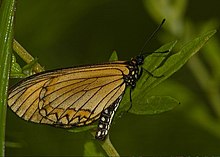| Yellow coster | |
|---|---|
 | |
| Imago | |
 | |
| Caterpillar | |
| Scientific classification | |
| Domain: | Eukaryota |
| Kingdom: | Animalia |
| Phylum: | Arthropoda |
| Class: | Insecta |
| Order: | Lepidoptera |
| Family: | Nymphalidae |
| Genus: | Acraea |
| Species: | A. issoria |
| Binomial name | |
| Acraea issoria (Hübner, 1819) | |
| Synonyms | |
Pareba vesta | |
Acraea issoria, the yellow coster, is a small, leathery-winged butterfly. This species of the subgenus (Actinote) and the tawny coster (Acraea (acraea) terpsicore) with its sister species (A. (a.) moluccana) and (A. (a.) meyeri) of the nominotypical subgenus, are the only Asiatic representatives of the predominantly African subfamily Acraeinae.
Contents
According to George Talbot (Fauna of British India) the race anomala is found in the western Himalayas while the nominate form is from the eastern Himalayas.
